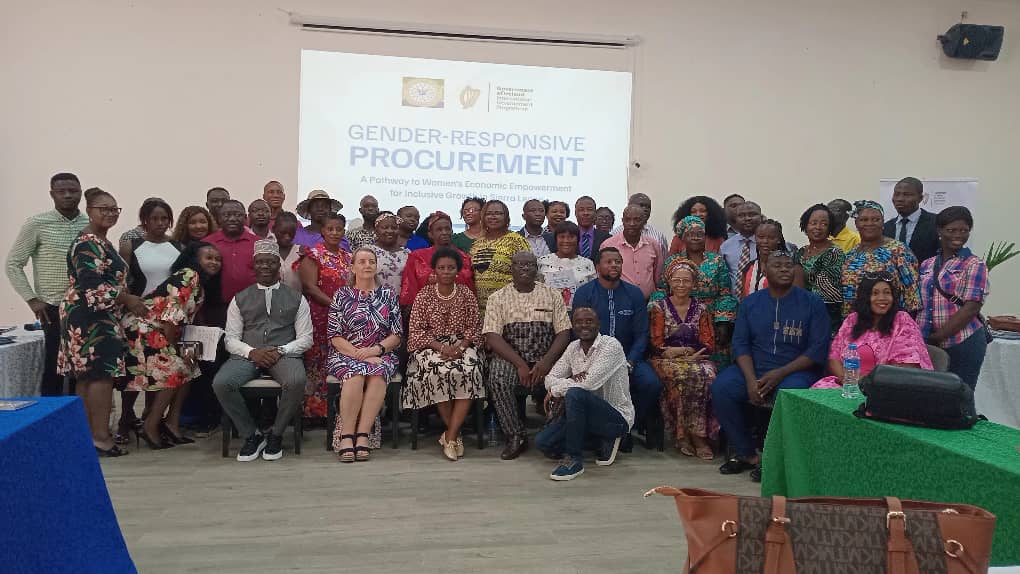By Marilyn King
The Budget Advocacy Network (BAN), in collaboration with the Government of Ireland’s International Development program, officially launched a series of reports on Gender-Responsive Procurement at New Brookfields Hotel in Freetown on Tuesday, 5th November, 2024. The launch event with the theme ‘’A Pathway to Women’s Economic Empowerment for Inclusive Growth in Sierra Leone, brought together key stakeholders to address the challenges and opportunities for increasing women’s participation in public procurement processes.
Ibrahim Tommy Esq., Executive Director of the Center for Accountability and Rule of Law (CARL), highlighted that the current legal framework does not mandate women’s participation in the highest administrative bodies overseeing public procurement. He stressed the need for reforms, recommending that the mandate of the public procurement oversight body be expanded to review procurement contracts quarterly and conduct gender-based analysis to assess the participation of women.
Ibrahim Tommy emphasized that advancing women’s participation would require a concerted effort to push for changes in policy, legal frameworks, and institutional practices. He suggested amending the Public Procurement Act of 2016 to align it with the 30% gender representation target outlined in the Gender Equality and Women’s Empowerment (GEWE) Act, particularly in procurement governance.
Madam Carol Hannon, Deputy Head of Mission at the Embassy of Ireland, discussed the barriers women face in participating in Sierra Leone’s procurement landscape. Drawing on studies conducted between 2021 and 2023, Madam Hannon outlined the systemic challenges that hinder women-led businesses from fully engaging in public procurement. These include both legal obstacles and entrenched social practices, such as the demand for sexual favors in exchange for work opportunities.
She concluded by underscoring that despite these challenges, women remain underrepresented in procurement activities and that a comprehensive approach is necessary to break down these barriers and boost women’s participation.
Abubakarr Kamara, Coordinator for the Budget Advocacy Network, emphasized the importance of creating a strong, vibrant network of women-led businesses to enhance their collective capacity in public procurement. Such a network, he argued, would provide vital resources, information, and support, enabling women entrepreneurs to better navigate the procurement process and successfully apply for, manage, and complete contracts.
The Coordinator pointed out that while women-led businesses are gaining increasing recognition for their contribution to economic development, many lack essential legal requirements to participate in national procurement processes. These include basic prerequisites such as having a business bank account, registration with the National Revenue Authority (NRA), and enrollment in the National Social Security and Insurance Trust (NASSIT).

In his keynote address, Charles Vandy, Deputy Chief Director at the Ministry of Gender and Children’s Affairs, reaffirmed the government’s commitment to promoting gender equality in economic decision-making. He emphasized that women’s access to finance and their ownership of businesses must be prioritized to unlock their full economic potential.
He also referenced the Gender Equality and Women’s Empowerment Act of 2022, which provides a framework to enhance women’s access to financial services and other resources critical for their business growth. He further noted that women-led businesses have won a small but significant share of public procurement contracts, with women securing 5% of total Request for Quotation (RQ) contracts, 39% of restricted bids, and 12% of National Competitive Bidding (NCB) contracts.
Mr. Vandy concluded by stressing the importance of the report’s practical recommendations, including the need for targeted training programs to increase women’s participation in public procurement.
The launch of the Reports on Gender-Responsive Procurement represents a pivotal step toward empowering women economically and fostering inclusive growth in Sierra Leone. The event highlighted the importance of creating a more equitable procurement landscape, where women can fully participate and contribute to the country’s development. Through continued advocacy, legal reforms, and institutional support, stakeholders hope to ensure that women-led businesses have the opportunity to thrive and drive sustainable economic growth.

